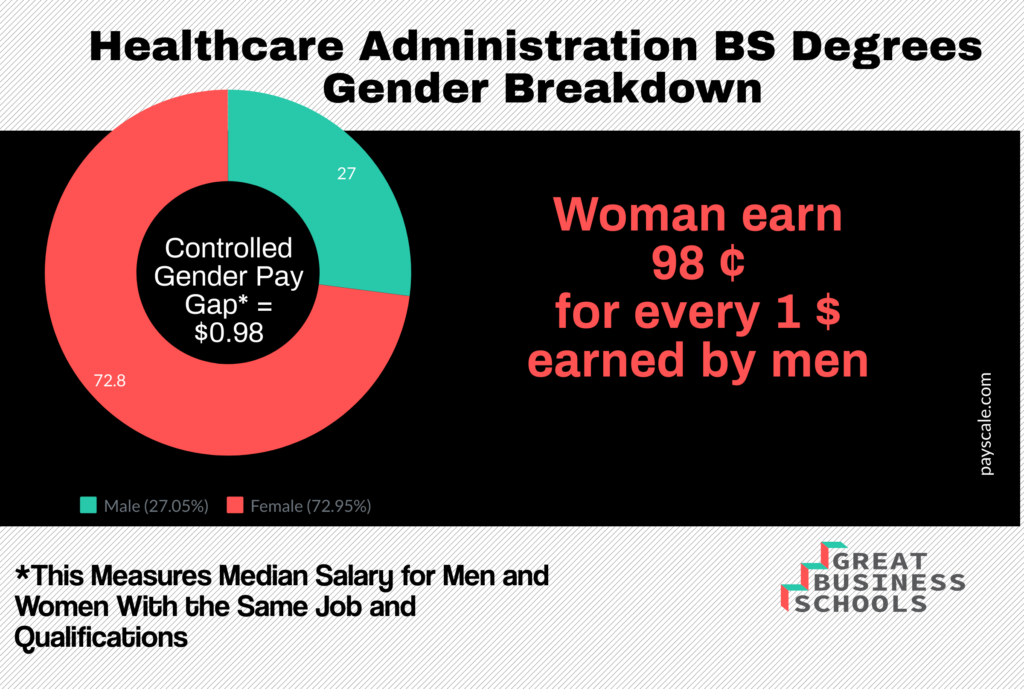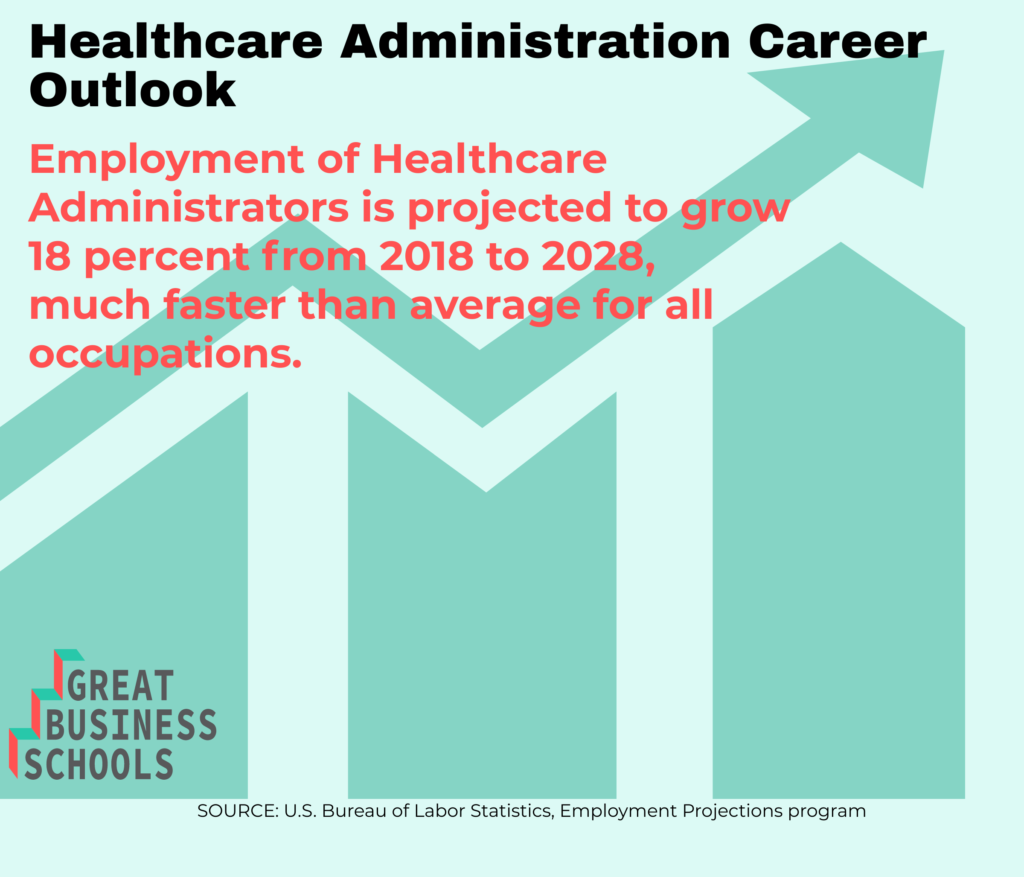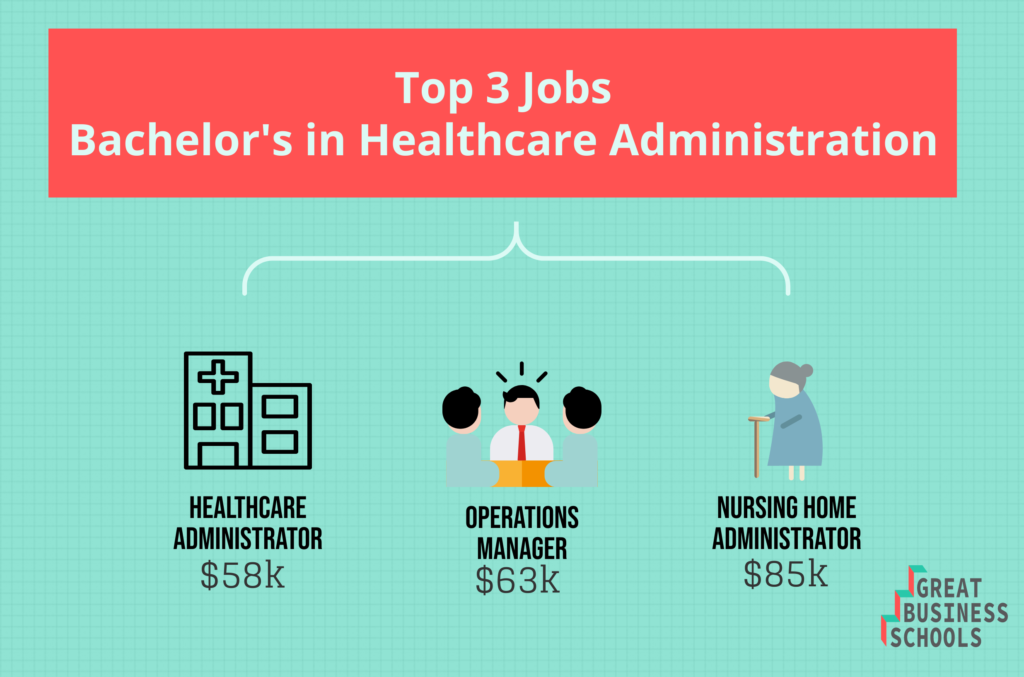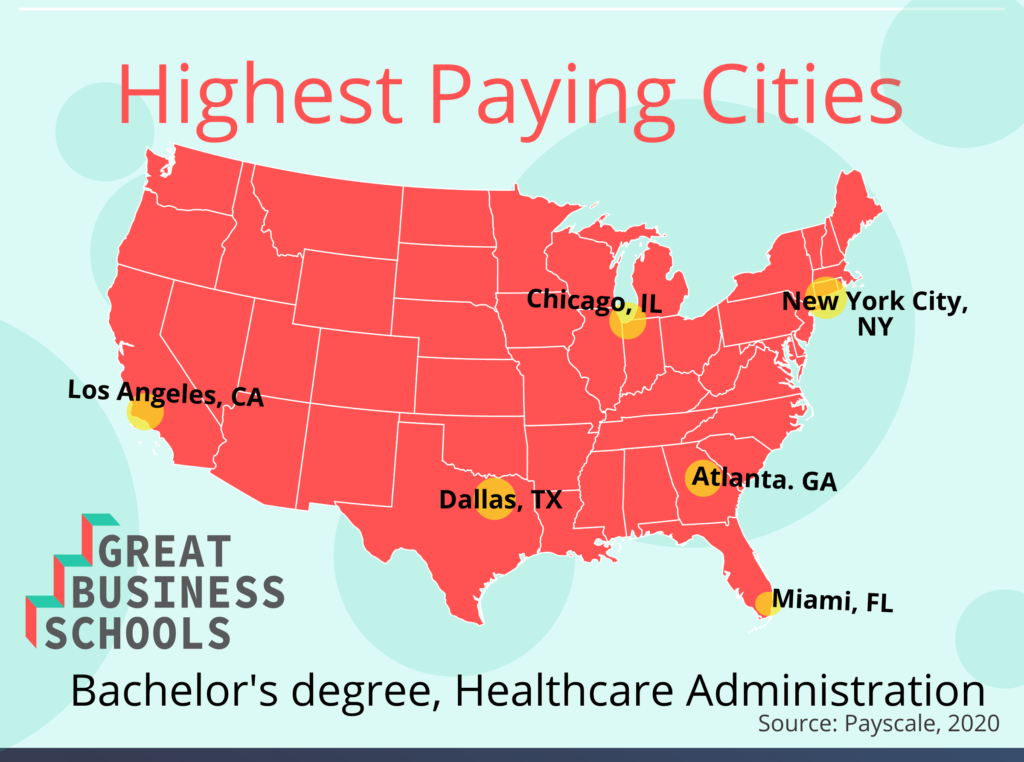A lot of people already know that healthcare is a growing field. Doctors, nurses, and their assistants are more needed in the US than they’ve ever been before.
However, the medical field contains far more workers than just doctors and nurses. There are a lot of people who make a difference in the medical field without a medical degree. They do the work that keeps hospitals, doctors’ offices, and other healthcare centers running. These healthcare workers include healthcare administrators and healthcare managers, both of whom play an important role in the healthcare field.
That said, these jobs don’t always get as much publicity as doctors and nurses. By nature, these jobs work behind the scenes. As a result, not every career seeker even knows that these jobs are options. That’s why there are so many questions surrounding healthcare administration and healthcare management. You may have some questions yourself.
Featured Programs

So, where do you start? You can start with the basics. What can you do with a major in healthcare administration? What is healthcare management? A lot of healthcare students ask themselves these questions before choosing a major. In the next several paragraphs, you’ll get an overview of healthcare administration and management work. You’ll also see what it takes to get started in these fields, how to find the right college or university, and why you should look into some professional organizations.
Before getting started, though, take a look at the healthcare management vs healthcare administration question. These two things have many similarities. They both require leadership skills, organization, and a high work ethic, for example.
However, there are several differences in healthcare management vs healthcare administration. Start with the healthcare management definition. What is healthcare management? Healthcare management deals with the overarching needs of a medical organization. A healthcare manager oversees multiple departments at once.
Throughout the day, a healthcare manager may work with other professionals on problem-solivng goals, keep up with hospital records and numbers, supervise assistants, and create shift schedules for other workers.
The career goals in healthcare administration, on the other hand, look a bit different. Someone with a major in healthcare administration is usually trained to oversee a specific department within a healthcare setting. While the healthcare management definition involves the big picture, healthcare administration involves hiring staff and dealing with funds.
Either way, a person who wants to pursue one of these careers will need to start with a great education. These careers require a fair amount of knowledge and training.
Accreditation for Health Administration Programs
A health administration or management career starts with finding the right school. Fortunately, there are lots of great colleges for healthcare work in the United States. These schools come in all sizes and formats, so you shouldn’t struggle to find the right school for your educational needs. However, it’s important that you do your research before you make a commitment.
When looking for the best schools for healthcare administration, undergraduate or otherwise, it’s important to look for accreditation. Accreditation is important for any student, but it’s especially important if you’re looking at healthcare administration colleges or want to be a healthcare management major.
When a school is accredited, it means that an unbiased and objective accrediting body has put their stamp of approval on that school. This school can prove that it meets high educational standards and that it gives students a relevant education.
When searching for the best schools for healthcare administration, undergraduate majors should look for accreditation first. This accreditation will let students show their future employers that they received a worthwhile and updated education.
On the other hand, if you attend a non-accredited school, your potential employers probably won’t take your resume seriously. They’ll have no way of knowing that you learned the right information and techniques in school. Furthermore, if you start your education at a non-accredited school, your credits likely won’t transfer if you decide to switch to an accredited institution. As a result, you may spend a lot more time and money on your education than you would have if you had looked for accreditation in the first place.
When it comes to healthcare administration colleges, you’ll want to look for two types of accreditation. First, make sure that the school itself is accredited. Look for regional accreditation mentioned on the school’s website. Each region of the United States has its own accrediting body, so keep in mind that a New England school will be accredited by a different organization than a school in the Southwest. If you have a hard time finding a school’s accreditation status, you can always search “[school name] accredited.”
Next, for healthcare management degree schools, makes sure that the healthcare program itself is accredited by the Commission on Accreditation of Healthcare Management Education, or CAHME. This organization examines health administration degree requirements, makes sure that healthcare programs stay up to date, and helps healthcare students make sure that their education can take them where they want to go.
This accreditation is especially important because healthcare technology is always evolving. You’ll want to make sure that your university is up to date on all of the latest procedures.
You can even find accredited online healthcare degrees as long as you look for the CAHME seal of approval. The best online schools for healthcare management are CAHME accredited online programs.

Types of Healthcare Administration/Management Degrees
For those who want to do the “behind the scenes” leadership work in the healthcare field, there are two main types of degrees: A BS Healthcare Administration degree (Bachelor of Health Administration), or a BS Healthcare Management degree (Bachelor of Healthcare Management)
In both a Bachelor of Health Administration and a Bachelor of Healthcare Management, students learn the basics of human anatomy, medical charts and terminology, and similar subjects. They also learn the leadership and management skills that they’ll need to oversee teams and systems.
A BS in Healthcare Administration, however, covers the day to day tasks of running a single department. While earning their Bachelor of Science, Healthcare Administration students may learn how to hire and manage staff, for instance. They may also learn about financial topics.
Meanwhile, a Bachelor’s of Science in Healthcare Management would cover the organizational skills that it takes to run multiple departments at the same time. Students may get an overview of different departments and an education on how to keep these departments organized.
On top of choosing healthcare administration or healthcare management, health students should also choose their best method of learning. For example, many students choose a traditional on-campus degree. These students generally live on campus or close to campus, and they attend classes on a regular daytime schedule.
This type of schedule works best for traditional students who enter college right after high school. However, there are other options for working adults who don’t have time for a traditional degree. For example, some colleges offer weekend and nighttime classes for these students.
Then there are accelerated programs, which take roughly half the time to complete. Keep in mind that these programs require the same amount of work as regular programs, but they require that work in a shorter amount of time. Accelerated options are challenging, but for those who have a limited amount of time and want to jump start their careers quickly, these options can provide exactly what they need.
There are several online healthcare degrees as well. When seeking a healthcare administration degree online or a healthcare management degree online, just make sure that you choose an accredited program. Again, online healthcare degrees can make great choices, but healthcare is too important to pursue the wrong education.
An online healthcare management degree, online hospital management degree, or online healthcare administration degree will work a lot like their on-campus counterparts. If you choose an online healthcare management or administration program, you’ll still take classes from knowledgeable professors, turn in assignments, and study outside of class.
The difference is that the healthcare administration degree online and the healthcare management degree online will both let you study from your own home. For busy adults with jobs, children, and other responsibilities, getting an online bachelor’s in healthcare management can be a much more doable option than taking classes on campus.
If you do pursue an online healthcare management degree, online hospital management degree, or similar online degree, just make sure that you have either the discipline or the adaptive tools necessary to log in to your classes when necessary.
Featured Programs
Certifications in Healthcare Management and Administration
What about a healthcare management online course? Can you earn an online healthcare management certificate? In some professions, those who don’t want a full bachelor’s degree can earn a certificate instead. Though similar to a bachelor’s degree, a certificate usually gets straight to the career-focused classes and doesn’t require electives to round out the studies. A lot of people earn a certificate first, get some work experience under their belts, and then go back for a full bachelor’s degree once they’ve saved some money.
Unfortunately, this path isn’t always feasable for healthcare administrators and managers. When it comes on online healthcare programs, certifications are usually meant for people who already have a full bachelor’s degree in a related field. For most of these online healthcare programs, certifications are graduate certificates, not undergraduate certificates.
Can you take a healthcare management online course and decide whether or not this career is for you? Absolutely. However, you will need a bachelor’s degree to get started in the healthcare field and make any real career progress.
You might look into adding an online healthcare management certificate to your current bachelor’s degree pursuits. Earning a healthcare management certification online can also take you toward a full bachelor’s degree if you want to work toward that degree but aren’t ready to fully take the plunge yet.

Careers in Healthcare Administration and Management
Once you’ve earned your bachelor’s degree, you can take on all sorts of healthcare management jobs or healthcare administration career options. Because this field is constantly growing, there’s no shortage of available jobs for trained and knowledgeable people.
Start by taking a look at healthcare management jobs. Entry level healthcare management jobs for those who hold a bachelor’s degree include. Here is a list of healthcare management careers:
- Physician Practice Manager
- Healthcare Administrator
- Quality and Improvement Manager
- Patient Finance Manager
- Health Insurance Manager
- Managed Care Representative
- Healthcare Department Manager
- Population Health Manager
What do these entry level healthcare management jobs have in common? First, they can all provide an exciting start down a healthcare management career path. With a Bachelor’s in Healthcare Management, jobs provide a quick step into the world of behind the scenes medical work. These Bachelor’s in Healthcare Management jobs also provide a chance to flex leadership abilities.
In any of these jobs, a healthcare manager would need to juggle multiple responsibilities at once. They’d need to keep a clear head and keep their information organized. Doctors, nurses, patients, and more rely on healthcare managers to keep everything together, whether they realize it or not.
In addition to the healthcare management career path and the list of healthcare management careers that come with it, there are also entry level jobs in healthcare administration.
For example, with a Bachelor of Science in Healthcare Administration, jobs can include things like medical office administrator. A medical office administrator answers phone calls, oversees administrative needs, and generally makes sure that their workplace runs smoothly and efficiently. They work in small private practices, large hospitals, and everything in between.
With a Bachelor of Science in Healthcare Administration, job description options can vary. That’s because Bachelor’s in in Healthcare Administration jobs cover a wide range of possibilities. There’s plenty of opportunity for job seekers. Whether you earn a Bachelor’s in healthcare administration or a Bachelor of Science in Business Administration, healthcare management jobs may include:
- Medical Director
- Director of Nursing
- Chief Nursing Officer
- Administrative Fellow
Those are just a handful of the possibilities, though. In your job search, you’ll likely find many other titles. In any case, when it comes to Bachelor’s in Healthcare Administration jobs, candidates must be confident managing and overseeing people. They must also have great organizational skills. Just like with healthcare managers, a lot of people count on healthcare administrators. Without administrators, healthcare centers couldn’t run effectively.
Healthcare Administration Salary
Because both of these degrees come with such a broad range of job opportunities, it can be hard to determine one’s potential salary in the field. However, one can take a look at averages to get a good idea of their potential financial outcome. For healthcare administration careers, salary hits an average of $66,724 per year. Meanwhile, the average healthcare management degree salary is $65,117. Healthcare workers can start earning money quickly, giving them a great ROI on their educations.
However, it’s important to remember that salaries can vary depending on several factors. First of all, experience matters. A person’s healthcare management degree salary can potentially get much higher as this person gains work experience. The same applies to a Bachelor’s in Healthcare Administration salary. The longer a person stays in the field, the more that person’s salary potential grows.
Location also matters when it comes to a Healthcare Management major salary or a Bachelor’s in Healthcare Administration salary. Someone who goes to work in a major city will likely make a lot more money than someone who takes a job in a less populated area. Big city hospitals can usually afford to pay much more than smaller hospitals and medical centers.
Next, of course, there’s the matter of need. Overall, the job market rises and falls, but the medical field will always need people to fill important roles, and that includes management and administrative jobs. Overall, lifespans have increased, meaning that there’s a big aging population. and a lot of people are retiring from the healthcare field.
On the negative side, this leaves a huge gap in the healthcare world. There are a lot of open slots and not a lot of people to fill them. On the positive side, this also means a lot of job opportunity for those with a healthcare management or healthcare administration degree. If you have the required training, you may very well get a job right after graduation.
What does all of this have to do with salary? Well, some areas have a bigger need than others. In these places, you may find incentives like larger salaries, sign-on bonuses, and other financial perks, even as a person who’s relatively new to the field. In an area with a smaller need, however, you probably won’t find quite as many incentives.
Another thing that can impact salary is one’s level of education. Even with a just Bachelor’s degree, a healh manager or administrator can earn a high salary. However, if you eventually pursue an affordable online Master’s in Healthcare Administration, you can increase your salary potential and broaden your range of potential jobs. You might choose to earn your bachelor’s degree now, gain some experience in the field, and then go back for your master’s degree later to increase your earning potential. Some jobs do require a master’s degree or higher, and these jobs pay more than bachelor’s degree jobs.
Finally, the specific job makes a difference, too. For example, a hospital department manager salary may look different than a chief nursing officer salary. Likewise, an administrative fellow salary may look different than a population health manager salary. While salary certainly matters, make sure that you also pay attention to which jobs you enjoy the most. The more you enjoy your job, the more likely you are to stick with it over time.
The bottom line, however, is that health management and health administration can both be lucrative careers. These jobs require specific training, have great potential for growth, and are extremely needed all across the United States. All of these factors can put you at an advantage when you start your job search.

Professional Organizations in Healthcare Administration
Once you’ve earned your bachelor’s degree, you should consider joining some professional organizations. These organizations come with a lot of benefits for their members.
For example, consider the networking opportunities. As a healthcare manager or healthcare administrator, you may struggle to meet people in your line of work once you clock out. That’s too bad, because networking has value. It helps people build names for themselves within their professions, and it can lead to career growth. Professional organizations can fill in the networking gap and help you meet people outside of your workplace.
Speaking of career growth, professional organizations provide other ways for people to expand their careers. These organizations often have job boards and other resources for members who are looking for work. In fact, you may find listings through a professional organization that you wouldn’t have found in a regular online search.
Through a professional organization, you may also find ways to continue your education. For one thing, some organizations offer continuing education credits that you might apply to your future master’s degree. For another thing, these organizations sometimes provide seminars and other learning opportunities.
Now that you’ve seen some of the benefits of professional organizations, what organizations can you join as a healthcare administrator or a healthcare manager? As a matter of fact, there are plenty, but you’ll see a few of the most prominent ones on this list.
- First, there’s the Healthcare Financial Management Association. This association is specifically for those who want to go into the financial part of healthcare management. It offers lots of career development tools, including job search resources and on-site education.
- The Health Care Administrators Association is a large networking association where healthcare workers can exchange ideas, stay on top of the latest news, and take advantage of learning opportunities.
- The American Health Information Management Association is for those who work in healthcare data. This association offer certification programs, networking opportunities, conferences, and other resources.
These are just a few of many health management and administration associations. Some are broad and some are specific, but by joining one or more, you can take advantage of career opportunities.
Carrie Morris
Author
Warren Dahl
Editor-in-Chief

